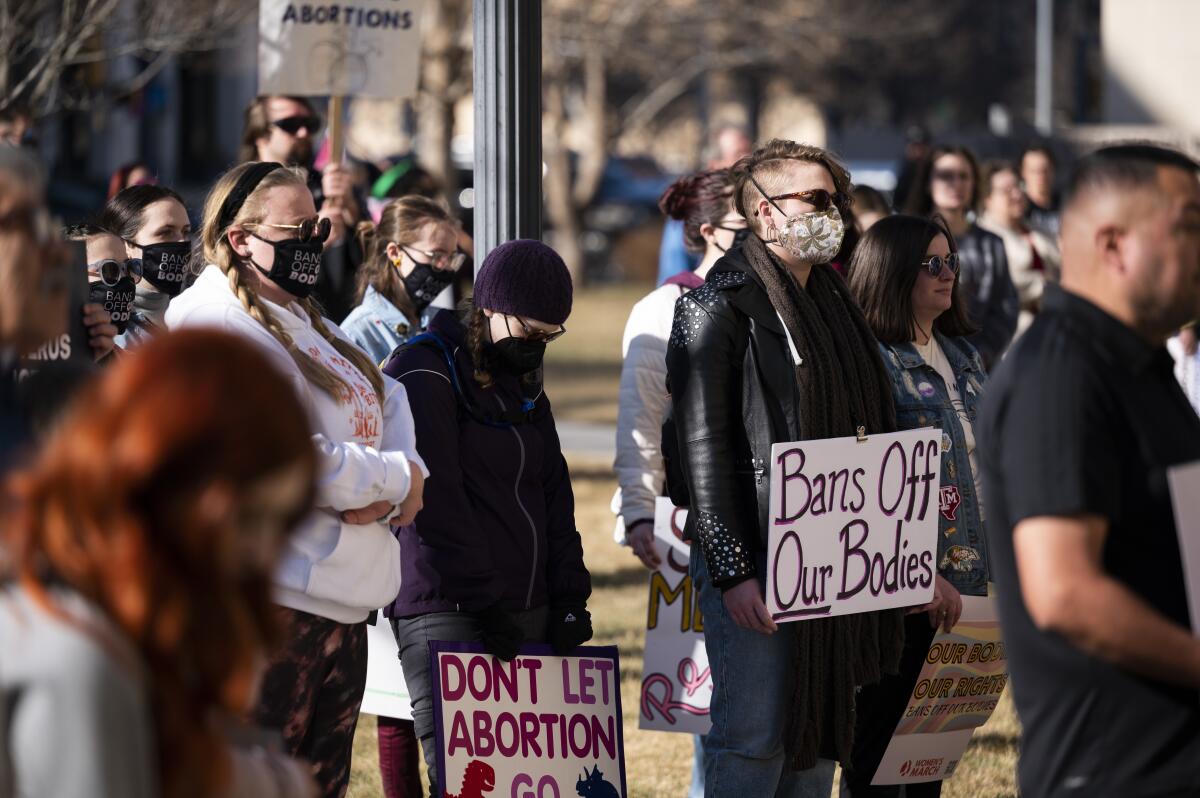Column: Hang on to the pill and your IUD: After abortion, birth control is the next fight

- Share via
Mark my words: Contraception is the next front in the war on women. And we can’t say we haven’t been warned.
In 2010, when the Affordable Care Act — Obamacare — was close to passing, Republicans argued strenuously against requiring companies to provide contraception as a healthcare benefit. Many argued that all forms of female contraception are tantamount to abortion.
A couple of years later, a man who was briefly a front-runner for the Republican presidential nomination, former Pennsylvania Sen. Rick Santorum, promised to be the first president to discuss the “dangers of contraceptives in this country.” Contraception, Santorum told a Christian political blogger, “is not OK. ... it’s a license to do things in the sexual realm that is counter to how things are supposed to be.”
In 2014, the Supreme Court weighed in, elevating the personal religious beliefs of employers above the healthcare rights of women when it ruled 5 to 4 in the Hobby Lobby case that privately held, for-profit companies could deny birth control coverage to their employees.
Last year, an even more right-wing Supreme Court upended American politics when it tossed out half a century of precedent and obliterated the federal right to abortion. In a concurring opinion in the Dobbs case, Justice Clarence Thomas wrote that since the court had found no constitutional right to abortion, perhaps it should reconsider other similar precedents “including Griswold,” the 1965 decision that legalized contraception in the United States.
And then last week, a federal judge in Texas declared that mifepristone, the safe and hugely popular medication used by more than half of the women in this country who choose to end early-stage pregnancies, should be off-limits because the Food and Drug Administration had wrongly approved it 20 years ago. On the same day, a federal judge in Washington state ruled just the opposite — that the FDA must keep medication abortion drugs available.
With conflicting rulings, this issue, obviously, is headed to the Supreme Court. Legal experts say it is almost unthinkable that the court would embrace such a precedent, allowing a judge to overrule the FDA’s medical determinations. Almost.
Given this current absurdist moment in American politics, people may have been distracted when the Right to Contraception Act, passed by the House, died in the Senate last summer after a single Republican senator (Joni Ernst, of Iowa) decided to block it. The act would have codified a federal right to birth control in all its glorious forms — the pill, the IUD, vaginal rings, injections.
Why would anyone — especially people who believe that abortion is murder — oppose a law like that?
Here’s how Gabrielle Jastrebski of FEMM Health explained it in 2019 as she discussed the evils of hormonal birth control at an annual conference of Students for Life, one of the largest antiabortion youth organizations in the country:
“Contraception and abortion are inextricably linked to one another, OK?” she said. “Contraception can really be seen as sort of the beginning of the road to abortion. … We are told that in order to be pro-women, we need to be pro-contraception. This is absolutely false.”
(FEMM Health, funded by Catholic antiabortion financier Sean Fieler, sows doubt about the safety of hormonal birth control while concealing its antiabortion ties, according to a Guardian investigation. Its app helps women monitor their menstrual cycles and hormones to control fertility, and the organization says it has been downloaded more than 400,000 times.)
The idea that abortion and contraception are two sides of the same coin is not a fringe view in right-wing Christian circles. And it’s why women of childbearing age in the United States should be very, very afraid.
The title of Jastrebski’s talk, by the way, was “Green Sex,” a concept that seems Goop-level silly at first blush, but rather dangerous upon examination.
“Green sex” is promoted by antiabortion activists and so-called wellness influencers as a hormone-free, sustainable, natural and eco-friendly way to avoid unwanted pregnancy. Instead of birth control of any sort, including condoms, it touts a “fertility awareness method” or “natural family planning.” According to the website Natural Womanhood, green sex can reverse “the environmental damage that the pill and condom use cause.” It also won’t do much to prevent pregnancy.
The green sex claim that massive amounts of estrogen are urinated into the wastewater supply by birth-control-pill-taking women has been debunked by scientists, who say that most estrogen in water comes naturally from soy and dairy products and animal waste. Also, say the experts, all human beings excrete hormones in their urine, especially pregnant women.
The antiabortion activist Lila Rose, who rose to fame with contrived “stings” of Planned Parenthood, has described hormonal birth control as “a pill that sterilizes you.” Well, of course, neither the pill, nor Plan B (a.k.a. the morning-after pill) “sterilize” anyone. They prevent ovulation.
Last year, Kiera Butler of Mother Jones covered the annual conference of the antiabortion group Heartbeat International. There, she discovered, attendees spoke about “pushing a far more ambitious future agenda: expanding the definition of abortion itself to include contraception.”
Some, she wrote, “considered anything that thwarted the meeting of sperm and egg to be unChristian.”
Is it so far-fetched to worry that a majority of our Supreme Court might agree?
More to Read
A cure for the common opinion
Get thought-provoking perspectives with our weekly newsletter.
You may occasionally receive promotional content from the Los Angeles Times.












